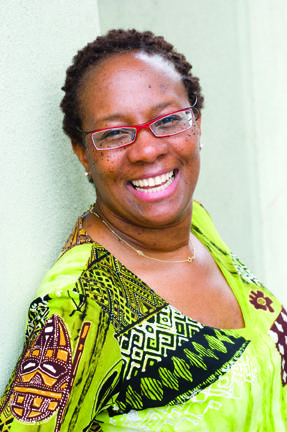The North American Black Experience

beautyinthedark.ca/im-stil-evolving
Joanne St. Lewis
Joanne St. Lewis, a distinguished lawyer and law professor at the University of Ottawa, gave a talk titled “Race Relations in Canada & the United States: Comparisons of the North American Black Experience” on Monday, Feb. 10. This marked one of Johnson’s first events this semester to reach out to students about Black History Month.
Other than being a tenured law professor, St. Lewis is, as Associate Professor of Humanities David Plazek put it, only one degree of separation from Nelson Mandela. She’s also a feminist and a human rights activist. Throughout her life she has helped negotiate land settlements with the Cree nation in Quebec, helped lay the groundwork for a legal structure in post-apartheid South Africa, and has worked to confront the issue of systematic and political rape in Sudan.
At her JSC presentation, St. Lewis began by describing herself as a first-generation Canadian whose parents emigrated from Trinidad, but whose relatives have come from all over the world.
She noted that her grandparents were indentured servants since Trinidad did not receive its independence until the ‘50s.
Having this background shapes and informs the way she thinks about issues. She said instead of being an outside issue, for her multiculturalism is a personal history.
Rather than living her life through the lens of just being black, she said she refuses to let others take her as that alone. “I’m a black feminist in some contexts. But in other contexts I’m a law professor, and in other contexts I’m a feminist without any kind of identifier because that’s what I’m engaged in doing.”
Also important to her is creating a forum for discussion on race and racism, doing about 12 presentations a month, and providing a perspective on how to view some of the race issues society struggles with today.
History, it turns out, ends up being key. She said it’s important to see how history sets a precedent, feeding the present race issues. “What that means to me is that the way we understand present problems is ahistorical. With my students I talk about it as a functional amnesia that serves power.”
To clarify, she used the example of a person stealing a purse and using the money. When time goes on, the children of the purse stealer inherit the money and the children of the person she stole it from still want it back. The children who have benefited from the money say that they did not do it and therefore have no responsibility.
This analogy pinpoints how nations build from exploiting people but then claim no responsibility when the decedents want retribution for what their ancestors had to give up.
“An analysis in colonialism of history allows both parties to see themselves as part of a continuum and measure what ought to be on the table for the conversation,” St. Lewis said. “It doesn’t tell you what the answer is to the conversation, but it provides more of an opportunity to understand what should be on the table.”
This funneled vision, she said, is why we look at African countries and wonder why they are impoverished and why they can’t get it right, without examining our own historical role in creating those vary problems.
Black History Month, she said, is important because it gives people a chance to talk about it. “When you name something you have an opportunity to talk about something,” she said. “You give it a label, it doesn’t tell you what you’re going to talk about, but it’s an opportunity to have a conversation.”
Closing her talk, St. Lewis described her experience working in apartheid in South Africa and how issues of race can be owned by anyone with a critical conscience. She encouraged students to not limit Black History Month to a domestic issue but consider it in global terms and use it as an opportunity to reach out to the international community. “We’re all diminished when we don’t grapple with it.”
Ben Simone joined the Basement Medicine Staff in Spring 2014, assuming the position of staff reporter.


